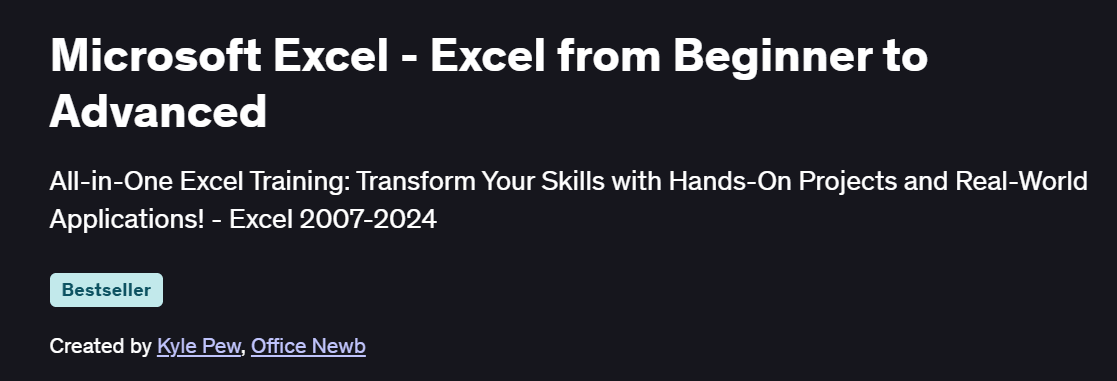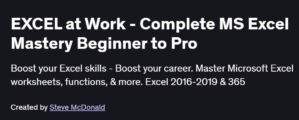What you will learn in Microsoft Excel – Excel from Beginner to Advanced Course
- Excel Fundamentals: Begin with the basics, including navigation, formatting, and data entry techniques.
- Core Functions: Master essential functions such as SUM, VLOOKUP, IF, INDEX, MATCH, and the newer XLOOKUP.
- Data Analysis Tools: Learn to analyze large datasets using PivotTables, PowerPivot, and advanced charting techniques.
Automation with Macros and VBA: Understand how to automate repetitive tasks using Macros and delve into Visual Basic for Applications (VBA) for custom solutions.
Time-Saving Shortcuts: Discover keyboard shortcuts and best practices to enhance productivity.
Real-World Applications: Apply your skills to create dynamic reports, dashboards, and solve complex business problems.
Program Overview
Excel Basics
⏳ 2 hours
Introduction to Excel interface and basic operations.
Data entry, formatting, and simple calculations.
Basic chart creation and data visualization.
Intermediate Excel Functions
⏳ 4 hours
In-depth exploration of functions like VLOOKUP, IF, and nested formulas.
Data validation and conditional formatting.
Introduction to PivotTables for data summarization.
Advanced Data Analysis
⏳ 6 hours
Advanced charting techniques and data visualization.
Utilizing PowerPivot for complex data models.
Advanced PivotTable functionalities.
Automation with Macros and VBA
⏳ 6 hours
Recording and editing Macros to automate tasks.
Introduction to VBA programming for custom solutions.
Creating user-defined functions and automating workflows.
Final Project and Certification
⏳ 3 hours
Capstone project applying all learned skills.
Submission and review of project work.
Issuance of Udemy Certificate of Completion.
Get certificate
Job Outlook
- High Demand: Proficiency in Excel is a fundamental skill sought after in various industries, including finance, marketing, and operations.
- Career Advancement: Advanced Excel skills can lead to roles such as Data Analyst, Financial Analyst, and Business Intelligence Specialist.
- Freelancing Opportunities: Excel expertise opens doors to freelance gigs, such as data cleaning, reporting, and dashboard creation.
- Salary Potential: Professionals with advanced Excel skills can command higher salaries and better job prospects.
Specification: Microsoft Excel – Excel from Beginner to Advanced Course
|
FAQs
- Excel is still the most widely used tool across industries for data management and reporting.
- It serves as the foundation for understanding data handling before moving to advanced tools.
- Even large corporations and government offices rely on Excel for daily operations.
- Its universal availability makes it a must-have skill for collaboration and professional growth.
- Advanced data tools often build upon concepts you first master in Excel.
- The timeline depends on your practice frequency and exposure to real-world use cases.
- On average, 1–3 months of consistent learning can get you from beginner to advanced concepts.
- Hands-on practice is more effective than just watching tutorials or reading.
- Using Excel in actual projects—workplace or personal—accelerates your progress.
- Continuous learning is key since Excel updates frequently with new functions.
- Excel is designed for everyone—students, professionals, and business owners alike.
- Most features are logic-based (sorting, filtering, formatting) rather than math-heavy.
- Even complex formulas often involve conditions, lookups, or text operations, not advanced math.
- A basic comfort with numbers helps but isn’t mandatory.
- With guided practice, anyone can reach advanced proficiency regardless of background.
- Excel proficiency is one of the top skills employers demand globally.
- It enhances efficiency, problem-solving, and decision-making in any role.
- Industries like finance, HR, sales, operations, and IT heavily rely on Excel expertise.
- Excel mastery often opens doors to roles in data analysis, reporting, and business intelligence.
- Demonstrating Excel skills can set you apart from other candidates in competitive job markets.
- Structured courses provide a clear path from basics to advanced topics, avoiding knowledge gaps.
- They include real-world examples that help in applying skills immediately.
- Self-study can work but often leads to missing out on advanced features or best practices.
- Courses offer guidance, assignments, and step-by-step practice that accelerate learning.
- Certification from structured learning also adds credibility to your résumé.





